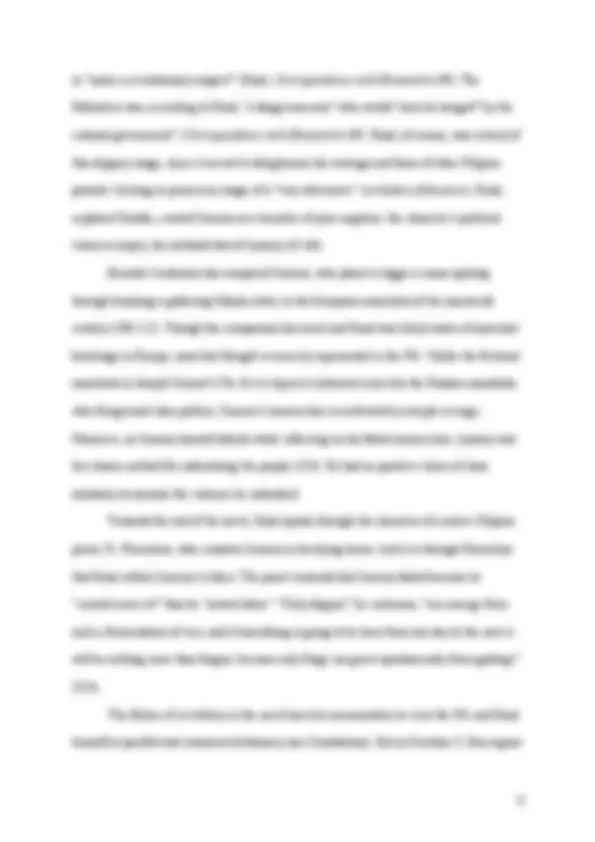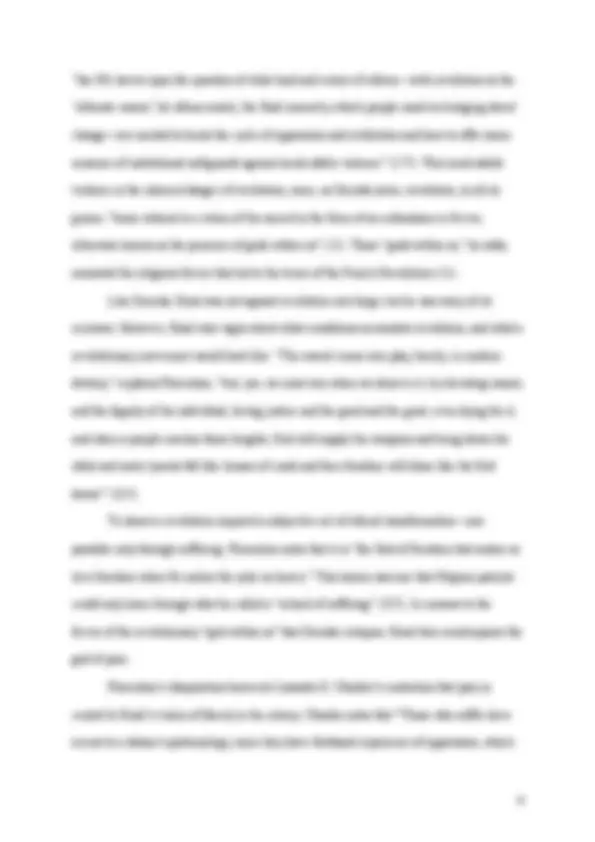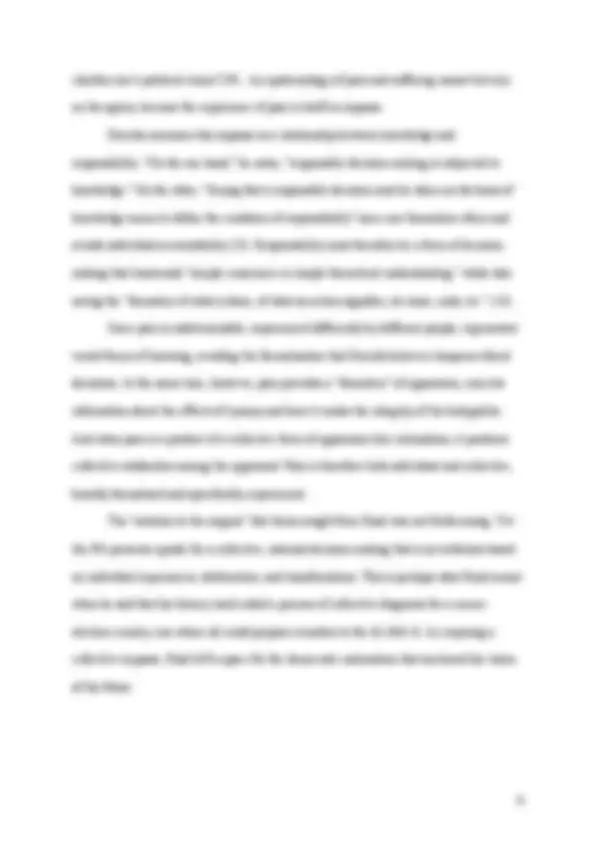





Study with the several resources on Docsity

Earn points by helping other students or get them with a premium plan


Prepare for your exams
Study with the several resources on Docsity

Earn points to download
Earn points by helping other students or get them with a premium plan
Community
Ask the community for help and clear up your study doubts
Discover the best universities in your country according to Docsity users
Free resources
Download our free guides on studying techniques, anxiety management strategies, and thesis advice from Docsity tutors
Jose Rizal: Liberalism and the Paradox of Coloniality. Palgrave. Macmillan, 2018. Constantino, Renato. “Veneration Without Understanding.” The Philippine ...
Typology: Lecture notes
1 / 7

This page cannot be seen from the preview
Don't miss anything!




Unpublished manuscript submitted to The Explicator****. Derrida’s “Aporia of Responsibility” in José Rizal’s El Filibusterismo Lisandro E. Claudio El Filibusterismo (1891), the sequel to Noli me Tangere (1887), is the more confounding of Filipino propagandist José Rizal’s two novels. Set roughly in Rizal’s own time, the Noli (as most Filipinos call it) is the story of Juan Crisostomo Ibarra, a Filipino mestizo who comes back to the Philippines after years of study in Europe. The protagonist returns, first, to reunite with his betrothed, Maria Clara, and, second, to build a modern European school—two efforts that fail after a reactionary and lecherous friar frames Ibarra for leading an anti- Spanish revolt. The novel ends with the fugitive Ibarra escaping the Philippines, hinting at a possible return. Apart from being a straightforward melodrama, the politics of the Noli are clear: Rizal argues that liberal reformism is doomed to fail in a colonial system run by religious authority—a position consistent with what we know about the state of his political beliefs at this time. By 1 887 , notes Schumacher, Rizal had already settled on the position that only independence from Spain could guarantee Filipinos basic civil liberties and rights (270). But despite his certainty about the need for independence, Rizal could not decide how to bring about this independence. At times, he believed the end of Spanish rule in the Philippines was inevitable given the deterioration of the Spanish empire. At other times, he thought revolutionary measures would be necessary to free his people. As novelist and historian Nick Joaquin explains, “The Hamlet split in Rizal between the will to act and the tendency to scruple preceded the flagrant schizophrenia of El Filibusterismo ” (55). It is this “Hamlet split” that has made the Fili a difficult text for readers since its publication in 1891. That year, fellow Filipino propagandist, Graciano Lopez Jaena, told
Rizal in private that the novel, though “magnificent,” sowed “anxiety in the hearts, darkness and doubt, and incredulity in the mind,” making it impossible to be understood “by minds which have just opened to the light, like our people.” Few readers, Jaena argued, would discover the “solution of the enigma” that Rizal presented (611). In the Fili, Ibarra returns incognito to the Philippines after wandering Europe and Latin America for thirteen years. As the jeweler Simoun, he acts as a grey eminence to the colony’s Governor General, coaxing him to implement draconian measures that would anger the people and sow the seeds of revolt—one that Simoun himself would lead. Like Ibarra’s school, Simoun’s revolt is a failure: his scheme is exposed, and the novel ends with him poisoning himself to avoid arrest. The ending is an impasse, and there are no solutions in Rizal’s novel. Rather than being a defect, however, I contend that the novel’s indeterminacy anchors its sense of political urgency, a position I share with Caroline S. Hau, who has emphasized the importance of reticence in both Rizal’s novels. Central to this reticence, I argue, is a meditation on the nature of responsibility. The Fili enacts what Jacques Derrida calls the “aporia of responsibility,” where indeterminacy unshackles decision-making from routinized thought (61). Rizal refused to provide a broad ethics of revolution, because, in Derrida’s words, “the generality of ethics incites to irresponsibility” as the mechanistic assessment of one’s actions dissolves singularity “in the medium of a concept” (61). Rizal was theorizing a collective revolution anchored on his nationalism, but he sought to do so in a way that did not efface the specificity of ethical reflection. Such was his impossible but necessary task. The filibustero , the subversive, was a vague term in colonial Philippines. Originally used to refer to pirates and freebooters as well as political adventurers and mercenaries in the Americas (see Aguilar), it had become by Rizal’s time anyone whom the authorities wanted
“the Fili leaves open the question of what kind and extent of reform—with revolution as the ‘ultimate reason’ (la ultima razón), the final means by which people insist on bringing about change—are needed to break the cycle of oppression and retribution and how to offer some measure of institutional safeguards against incalculable violence” (177). This incalculable violence is the inherent danger of revolution, since, as Derrida notes, revolution, in all its guises, “bears witness to a return of the sacred in the form of an enthusiasm or fervor, otherwise known as the presence of gods within us” (21). These “gods within us,” he adds, animated the religious fervor that led to the terror of the French Revolution (21). Like Derrida, Rizal was not against revolution writ large, but he was wary of its excesses. However, Rizal was vague about what conditions necessitate revolution, and what a revolutionary movement would look like. “The sword comes into play, barely, in modern destiny,” explains Florentino, “but, yes, we must win when we deserve it, by elevating reason and the dignity of the individual, loving justice and the good and the great, even dying for it, and when a people reaches those heights, God will supply the weapons and bring down the idols and make tyrants fall like houses of cards and then freedom will shine like the first dawn!” (325). To deserve revolution required a subjective act of ethical transformation—one possible only through suffering. Florentino notes that it is “the God of freedom that makes us love freedom when He makes the yoke so heavy.” This lesson was one that Filipino patriots could only learn through what he called a “school of suffering” (325). In contrast to the fervor of the revolutionary “god within us” that Derrida critiques, Rizal then counterposes the god of pain. Florentino’s disquisition bears out Lisandro E. Claudio’s contention that pain is central to Rizal’s vision of liberty in the colony. Claudio notes that “Those who suffer have access to a distinct epistemology, since they have firsthand experience of oppression, which
clarifies one’s political vision”(29). An epistemology of pain and suffering cannot but rely on the aporia, because the experience of pain is itself an impasse. Derrida examines this impasse as a relationship between knowledge and responsibility. “On the one hand,” he notes, “responsible decision-making is subjected to knowledge.” On the other, “Saying that a responsible decision must be taken on the basis of knowledge seems to define the condition of responsibility” since one thematizes ethics and avoids individual accountability (23). Responsibility must therefore be a form of decision- making that transcends “simple conscience or simple theoretical understanding,” while also noting the “thematics of what is done, of what an action signifies, its cause, ends, etc.” (23). Since pain is indeterminable, experienced differently by different people, it generates varied forms of knowing, avoiding the thematization that Derrida believes cheapens ethical decisions. At the same time, however, pain provides a “thematics” of oppression, concrete information about the effects of tyranny and how it erodes the integrity of the bodypolitic. And when pain is a product of a collective form of oppression like colonialism, it produces collective solidarities among the oppressed. Pain is therefore both individual and collective, broadly thematized and specifically experienced. The “solution to the enigma” that Jaena sought from Rizal was not forthcoming. Yet the Fili presents a guide for a collective, national decision-making that is nevertheless based on individual experiences, deliberation, and transformation. This is perhaps what Rizal meant when he said that his literary work aided a process of collective diagnosis for a cancer- stricken country, one where all could propose remedies to the ill ( Noli 3). In conjuring a collective impasse, Rizal left a space for the democratic nationalism that anchored his vision of the future.
Schumacher, John N. The Propaganda Movement: 1880-1895: The Creation of a Filipino Consciousness, the Making of a Revolution. Ateneo de Manila UP, 1997.